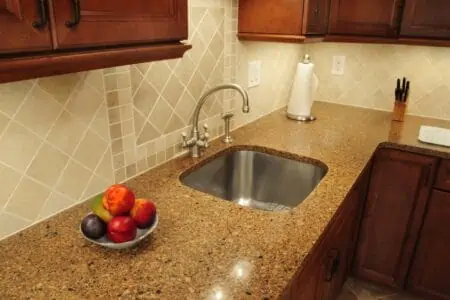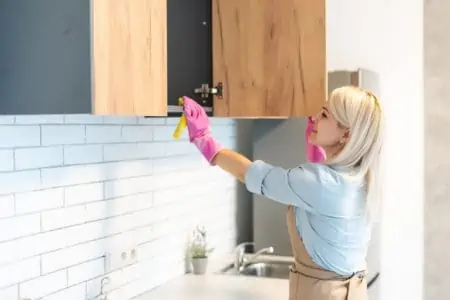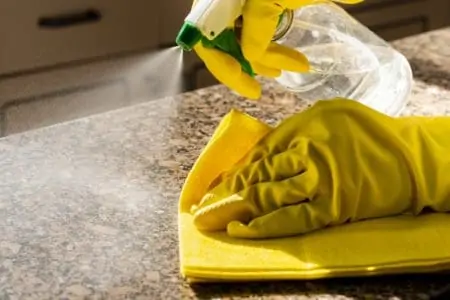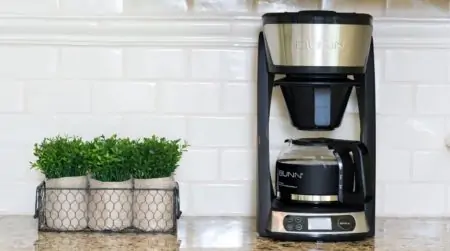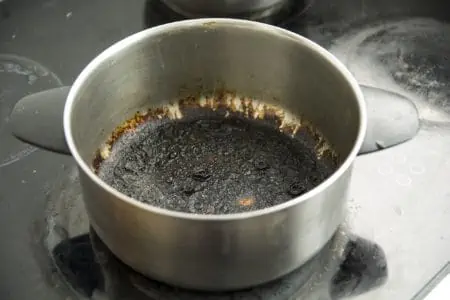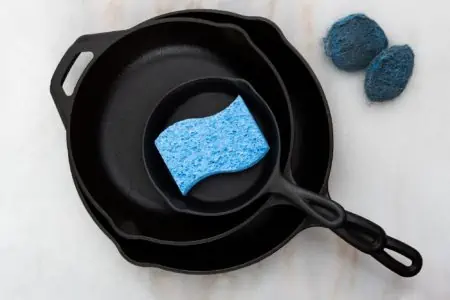Quartz is a beautiful, durable and relatively stain-resistant material. Since it’s non-porous, it can reject spills and stains more than other materials. However, they’re not 100 percent stain-resistant, especially if you leave liquids and messes on the surface for too long.
If your quartz has been stained, we can help. We’ll show you how to remove stains from quartz using specialized cleaners, vinegar, dish soap, and other handy products.
Once you’ve removed the stain and spruced up your quartz, it will return to its original glory.
Key Takeaways
- Use a specialized quartz cleaner or a mixture of distilled white vinegar and water to remove stains from quartz surfaces.
- Dish soap and water can serve as a gentle cleaner for daily maintenance of quartz countertops.
- Avoid using bleach, harsh chemicals, and abrasive tools on quartz to prevent permanent damage.
- To prevent staining, clean up spills immediately and protect quartz surfaces from heat and direct sunlight.
Does Quartz Stain Easily?
Quartz does not stain easily. It’s non-porous, so spills and messes can’t penetrate the stone. While we recommend cleaning messes up right away, you’re not at huge risk if you forget or get distracted. In fact, this is an excellent stone option for big families with young children.
However, while quartz can resist stains, it’s not 100 percent stain-proof. Quartz, especially when used as flooring or countertops, still consists of resins and pigments. These elements can react with certain spills, messes, and chemicals, leading to stains.
Overall, quartz is low maintenance and easy to clean.
How to Get Stains Out of Quartz
When you notice a stain on your quartz, we recommend tackling it as soon as possible, despite the rumors that you don’t need to. This is a pretty expensive material, and we want to take the best care of it. We’ll share a few different cleaning methods for removing stains from quartz.
With Quartz Cleaner
It’s a good idea to have a specialized quartz cleaner to hand when you’re the proud owner of such a lovely stone. Many options are available, but one of the best is Weiman Quartz Countertop Cleaner. Whether you’re cleaning up coffee, red wine, or other marks, this can help.
Here’s how to use products like this:
- Test: Before cleaning your quartz, test it in an inconspicuous area, like the back of the counter, where you keep an appliance. If it doesn’t stain or react with the material, move on to the next step.
- Spray: Spray the stain directly with the cleaner.
- Wipe: Wipe the cleaner with a soft cloth to remove the stain and shine up the surface.
With Stain Remover
There are specialized stain removers specifically for quartz, such as Bar Keepers Friend Granite & Stone Cleaner. It’s essential to double-check that the stain remover you’re considering is safe for quartz.
- Spray: Spray the stain remover onto the stain.
- Wait: Wait for about one minute (or the product’s recommended time).
- Rub: Rub the area with a gentle sponge or microfiber cloth.
- Wipe: Wipe the area dry with a separate cloth or paper towel.
With Vinegar
The acid in vinegar is great for removing stains, but it can dull down the glossy finish on your quartz. So you must dilute the vinegar.
- Dilute the vinegar: In a spray bottle, make a 1:4 solution of distilled white vinegar and water.
- Spray: Spray the stain with the vinegar water and wait for up to eight hours. The more stubborn the stain is, the longer you should leave it. But some stains might start to lift after only a few minutes, so keep an eye on them.
- Wipe: Gently scrub the area with a microfiber cloth to remove the stain and vinegar residue.
With Dishwashing Liquid
Mild dish soap is gentle enough to clean the quartz, remove stains and prevent damage. This is great for removing stains but also for daily cleaning.
- Mix water and soap: Create a soapy solution of warm water and dish soap in a bowl or sink.
- Dampen a sponge: Dampen a sponge or cloth in the mixture and gently but firmly scrub at the stain. Leave the solution on the stain for 10 minutes if necessary.
- Wipe: Wipe the stain again with a damp cloth to remove all soapy residue.
With Rubbing Alcohol
For stubborn stains that the above methods can’t handle, try rubbing alcohol. It works as a cleanser and a stain remover with the ability to tackle build-up on your quartz surface.
- Dampen a cloth: Dampen a white cloth (to avoid color transfer) with rubbing alcohol.
- Rub the stain: Rub the stain gently but firmly with the dampened cloth. Continue until the stain has lifted.
- Rinse: Wipe the area with a cloth dampened in plain warm water. This will remove loosened residue and alcohol traces.
Extra Tip
For extra stubborn stains or sticky messes, combine ¼ cup of rubbing alcohol with three drops of dish soap. Add some water to dilute and use this to tackle stains. The combination of alcohol and dish soap creates an even more powerful degreaser.
With Glass Cleaner
It’s safe to use glass cleaner to remove heavy and dried stains. Popular products include Windex or Glass Plus.
- Spray: Spray a generous amount of glass cleaner onto the stain.
- Wait: Leave it to settle for 10 minutes.
- Wipe: Wipe away with a non-abrasive sponge. Repeat if necessary.
How to Remove Water Stains From Quartz Countertops
Water stains and rings are one of the biggest enemies of quartz. Water left on the surface for too long can damage the protective seal, leaving behind stubborn stains. Here’s how to attempt to remove the stain:
- Make a paste: Mix a 1:1 solution of baking soda and water to create a watery paste. It shouldn’t be too thick, so add more water if necessary.
- Apply: Pour the paste over the stain and rub it in with a microfiber cloth.
- Cover: Cover the stain and baking soda paste with plastic wrap. This will help to create a warm seal that can pull the stain out of the quartz.
- Wipe: After about 10 minutes, wipe the liquid away. Repeat if necessary.
If it’s stained from hard water ruining your quartz’s appearance, try scrubbing it with fine steel wool. Make sure you’re gentle and move in circular motions. After you’ve removed the hard water deposits, wipe with a dry cloth to remove the loosened particles.
How to Remove Yellow Stains From Quartz Countertops
Yellow stains can be caused by certain types of food, including oil-based substances. There are a few methods you can try. We’ll walk you through a couple.
Rubbing Alcohol or Acetone
Apply rubbing alcohol or acetone onto a microfiber cloth and rub at the stain vigorously for 15 minutes. Clean the alcohol or acetone off with soapy water.
Oil Stain Remover
An oil stain remover for stone, such as the Stonetech stain remover, can work wonders. Whatever product you choose, follow the manufacturer’s guidelines precisely. For Stonetech, that involves spreading a thick paste, leaving it for 48 hours, and then scraping it off.
Tips For Removing Tough Stains From Quartz
From our research, we found that the methods we shared are the best for removing all kinds of stains from quartz. If you’ve tried them all with no luck, we recommend contacting the manufacturer of your quartz piece. They might send somebody out to clean or fix it, especially if the warranty still covers it.
You could also reach out to a stone or quartz cleaning professional who can help remove the stains.
If you cannot access a professional cleaner, there is one more thing you can try: an adhesive remover. Follow these steps:
- Apply an adhesive cleaner: An adhesive cleaner, like Goo Gone, can pull the stain out of the quartz. Pour it directly onto the stain and wait for five to 10 minutes.
- Wipe: Wipe all residue of the cleaner off the quartz.
- Wipe with warm water: Wipe the area again with warm water, repeating until there is no sticky residue left behind.
Warning
Always test cleaners in an inconspicuous spot first. When using Goo Gone, test a little in a hidden spot on the counter and leave it for five or 10 minutes. Follow all the steps and evaluate any potential damage. If you notice damage, do not use this product on your quartz.
How to Prevent Quartz From Staining
Quartz countertop stain removal isn’t super tricky, but it’s important to prevent stains in the first place. This will save you time, money, and stress along the way. Here are our top tips:
- Avoid contact with certain materials: Don’t expose your quartz to bleach, cleaners with a high pH level, paint, nail polish remover, oily soaps, paint remover, permanent ink markers, or glue. These materials can stain your quartz permanently.
- Avoid heat: Don’t expose your quartz to heat. When pulling something out of the oven, always put a pad or trivet down first. When exposed to heat, quartz countertops can burn, causing irreparable damage.
- Avoid direct sunlight: Direct sunlight can cause permanent discoloration. Consider blinds or a curtain if your kitchen gets a lot of direct sunlight.
- Clean messes immediately: This might be the most obvious tip, but it’s important to reiterate it. When you spill anything on your quartz countertop, clean it up immediately. We recommend something mild, like dish soap or quartz cleaner, that won’t wear down the resins.
- No abrasive tools: When daily cleaning your quartz, use soft tools like cloths. Avoid abrasive sponges or scrubbers, which can cause scratches in the resin.
- Don’t leave wet items: When you leave wet items, particularly wet metal (such as knives or pots), it can lead to rust stains which are tricky to remove.
The Deal With Seal
You don’t need to reseal quartz countertops. It’s pre-sealed, and it’s good for life. However, if you have quartzite countertops, they will need to be resealed once or twice a year.
FAQs
Cleaning Quartz: Recap
We’ve walked you through how to remove stains from quartz countertops in a way that is safe, effective, and will cause zero damage. Quartz is expensive, so we don’t want to cause any permanent discoloration or stains.
To recap, you can use a quartz cleaner, stain remover, or vinegar to clean quartz. Dish soap is a great daily cleaner and stain remover. Rubbing alcohol and glass cleaners are handy for stubborn stains.
Never use bleach, harsh cleaners, abrasive scrubbing tools, or nail polish remover to clean your quartz. This could damage it forever.
